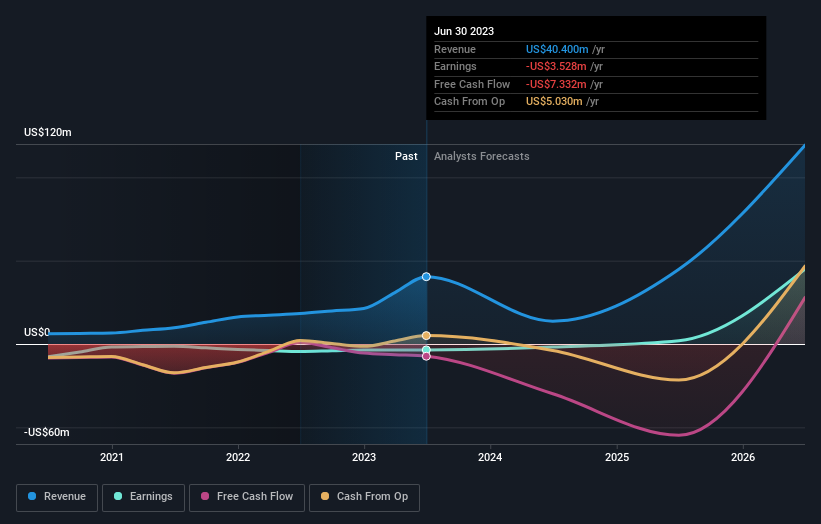- Australia
- /
- Oil and Gas
- /
- ASX:PEN
Peninsula Energy (ASX:PEN investor five-year losses grow to 40% as the stock sheds AU$31m this past week

In order to justify the effort of selecting individual stocks, it's worth striving to beat the returns from a market index fund. But even the best stock picker will only win with some selections. At this point some shareholders may be questioning their investment in Peninsula Energy Limited (ASX:PEN), since the last five years saw the share price fall 49%. We also note that the stock has performed poorly over the last year, with the share price down 27%.
After losing 12% this past week, it's worth investigating the company's fundamentals to see what we can infer from past performance.
See our latest analysis for Peninsula Energy
Peninsula Energy isn't currently profitable, so most analysts would look to revenue growth to get an idea of how fast the underlying business is growing. Generally speaking, companies without profits are expected to grow revenue every year, and at a good clip. That's because it's hard to be confident a company will be sustainable if revenue growth is negligible, and it never makes a profit.
Over five years, Peninsula Energy grew its revenue at 32% per year. That's better than most loss-making companies. Shareholders are no doubt disappointed with the loss of 8%, each year, in that time. You could say that the market has been harsh, given the top line growth. If that's the case, now might be the smart time to take a close look at it.
You can see below how earnings and revenue have changed over time (discover the exact values by clicking on the image).

Take a more thorough look at Peninsula Energy's financial health with this free report on its balance sheet.
What About The Total Shareholder Return (TSR)?
Investors should note that there's a difference between Peninsula Energy's total shareholder return (TSR) and its share price change, which we've covered above. The TSR is a return calculation that accounts for the value of cash dividends (assuming that any dividend received was reinvested) and the calculated value of any discounted capital raisings and spin-offs. We note that Peninsula Energy's TSR, at -40% is higher than its share price return of -49%. When you consider it hasn't been paying a dividend, this data suggests shareholders have benefitted from a spin-off, or had the opportunity to acquire attractively priced shares in a discounted capital raising.
A Different Perspective
Peninsula Energy shareholders are down 27% for the year, but the market itself is up 9.3%. Even the share prices of good stocks drop sometimes, but we want to see improvements in the fundamental metrics of a business, before getting too interested. Regrettably, last year's performance caps off a bad run, with the shareholders facing a total loss of 7% per year over five years. Generally speaking long term share price weakness can be a bad sign, though contrarian investors might want to research the stock in hope of a turnaround. It's always interesting to track share price performance over the longer term. But to understand Peninsula Energy better, we need to consider many other factors. To that end, you should learn about the 2 warning signs we've spotted with Peninsula Energy (including 1 which is significant) .
Of course, you might find a fantastic investment by looking elsewhere. So take a peek at this free list of companies we expect will grow earnings.
Please note, the market returns quoted in this article reflect the market weighted average returns of stocks that currently trade on Australian exchanges.
New: Manage All Your Stock Portfolios in One Place
We've created the ultimate portfolio companion for stock investors, and it's free.
• Connect an unlimited number of Portfolios and see your total in one currency
• Be alerted to new Warning Signs or Risks via email or mobile
• Track the Fair Value of your stocks
Have feedback on this article? Concerned about the content? Get in touch with us directly. Alternatively, email editorial-team (at) simplywallst.com.
This article by Simply Wall St is general in nature. We provide commentary based on historical data and analyst forecasts only using an unbiased methodology and our articles are not intended to be financial advice. It does not constitute a recommendation to buy or sell any stock, and does not take account of your objectives, or your financial situation. We aim to bring you long-term focused analysis driven by fundamental data. Note that our analysis may not factor in the latest price-sensitive company announcements or qualitative material. Simply Wall St has no position in any stocks mentioned.
About ASX:PEN
Peninsula Energy
Operates as a uranium exploration company in the United States.
Exceptional growth potential with excellent balance sheet.


